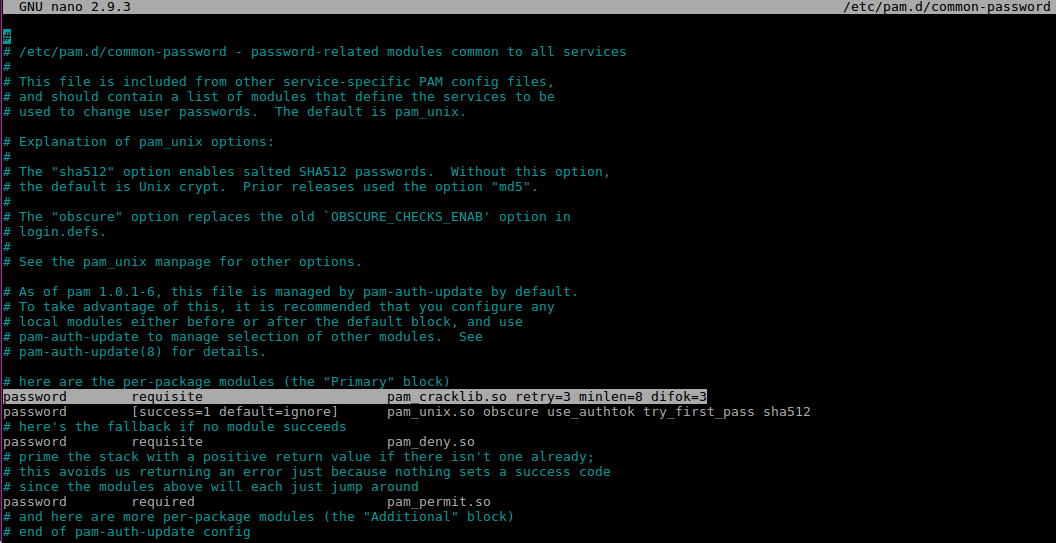Linux Password Policy is often overlooked. This post is to raise awareness how we can up our game in terms of password complexity for Linux systems. Setting up password complexity in Linux specifically Ubuntu Server more specifically 18.04.1 is achieved through Pluggable Authentication Modules (PAM). To authenticate a user, an application such as ssh hands off the authentication mechanism to PAM to determine if the credentials are correct. There are various modules that can be modified within PAM to set-up aspects like password complexity and account lockout and other restrictions. We can check what modules are installed by issuing:
sudo man -k pam_
By default Ubuntu requires a minimum of 6 characters. In Ubuntu this is controlled by the module pam_unix which is used for traditional password authentication, this is configured in debain/ubuntu systems in the file /etc/pam.d/common-password (RedHat/Centos systems its/etc/pam.d/system-auth). Modules work in a rule/stack manner processing one rule then another depending on the control arguments. An amount of configuration can be done in the pam_unix module, however for more granular control there is another module called pam_cracklib. This allows for all the specific control that one might want for a secure complex password.
A basic set of requirements for password complexity might be:
A minimum of one upper case
A minimum of one lower case
A minimum of least one digit
A minimum of one special character
A minimum of 15 characters
Password History 15
Lets work through on a test Ubuntu 18.04.1 server how we would implement this. First install pam_cracklib, this is a ‘pluggable authentication module’ which can be used in the password stack. ‘Pam_cracklib’, will check for specific password criteria, based on default values and what you specify. For example by default it will run through a routine to see if the password is part of a dictionary and then go on to check for your specifics that you may have set like password length.
First lets install the module, it is available in the Ubuntu repository:
sudo apt install libpam-cracklib
The install process will automatically add a line into the /etc/pam.d/common-password file that is used for the additional password control. I’ve highlight it below:
We can then further modify this line for additional complexity. working on the above criteria we would add:
ucredit=-1 : A minimum of one upper case
lcredit=-1 : A minimum of one lower case
dcredit=-1 : A minimum of least one digit
ocredit=-1 : A minimum of one special character
minlen=15 : A minimum of 15 characters.
note the -1 number represents a minimum value to subtract from the minlen value. There is nothing to stop you incresing this, for example ocredit=-3 would require the user to add 3 special characters.
Password history is actually controlled by pam_unix so we will touch on this separately.
Default values that get added are:
retry=3 : Prompt user at most 3 times before returning an error. The default is 1.
minlen=8 : A minimum of 15 characters.
difok=3 : The amount of character changes in the new password that differentiate it from the old password.
Our new arguments would be something like this:
password requisite pam_cracklib.so retry=3 minlen=15 difok=3 ucredit=-1 lcredit=-1 dcredit=-1 ocredit=-1
For password history first we need to create a new file for pam_unix to store old passwords (hashed of course). Without this password changes will fail.
touch /etc/security/opasswd
chown root:root /etc/security/opasswd
chmod 600 /etc/security/opasswd
Add the ‘remeber=15‘ to the end of the pam_unix line and your done, at least for now. Both lines should look like this:
These changes are instant, no need to reboot or restart any service.
Now all that is left to do is test your new password policy. Whilst this does provide good password complexity I would always suggest you use a public/private key pair for SSH access and disable password authentication specifically for this service.
I hope this helps.


